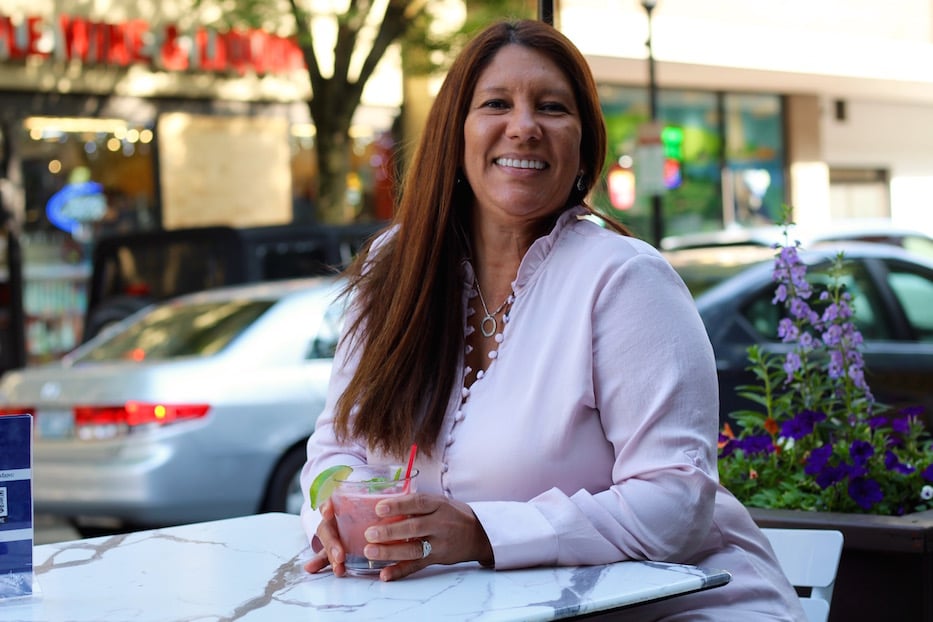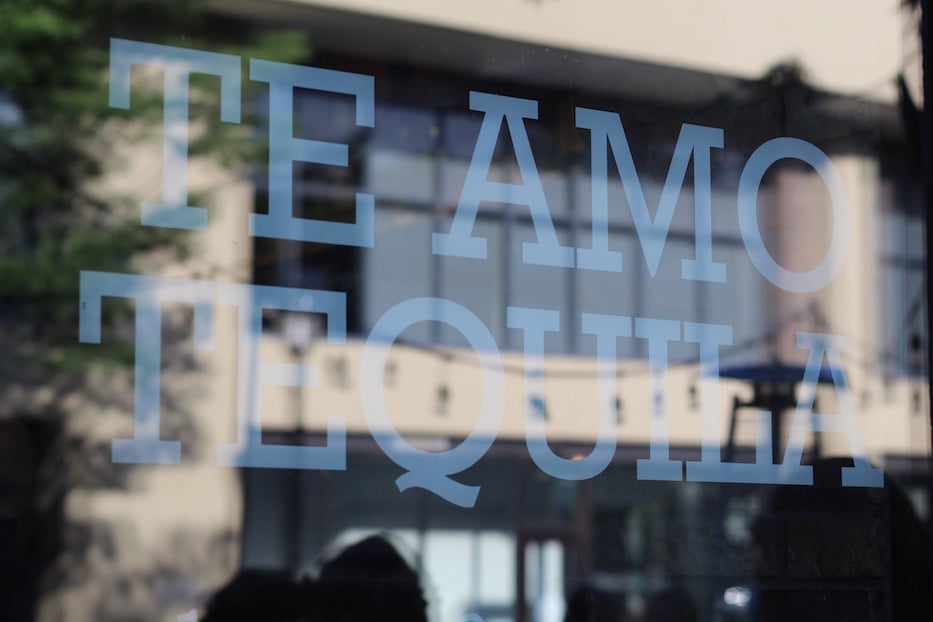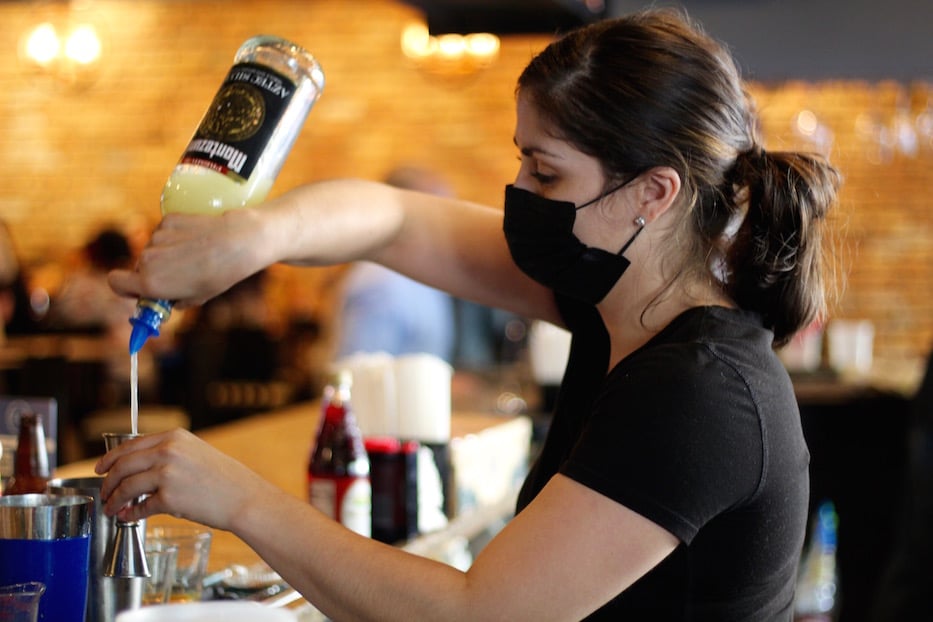
Sonia Salazar on Temple Street. Lucy Gellman Photos.
On a recent Saturday night, almost every seat at Te Amo Tequila was full. An aroma of sweet corn, chorizo and bubbly cheese drifted out onto the street. Customers laughed and chatted, some spilling out onto the restaurant’s outdoor seating while others remained inside. Vintage Marc Anthony blared over the speakers. A single corner table sat open behind a Frida Khalo painting, as if it was waiting for a new arrival.
Te Amo Tequila Bar & Tacos is located on 182 Temple St., where restaurants, package stores and ice cream shops sit cozily shoulder to shoulder and pull in foot traffic. Walking down the street, the restaurant's hi-top tables and black seats are easy to spot.
A year after reopening its doors during the pandemic, Te Amo is bouncing back. Restauranter Sonia Salazar has kept the business afloat while also managing Barracuda Bistro & Bar down Chapel Street. The restaurant has welcomed back customers with new public safety guidelines during the Covid-19 pandemic. This summer, it has been buzzing.
“I wake up every day, thinking of that support,” Salazar said in a recent interview at the restaurant. “We’ve always had that from our clients.”
Salazar said the Temple Street restaurant never truly closed down—it just pivoted. When the state issued shelter-in-place orders last March, Salazar was in the midst of thinking about opening a third restaurant. Ultimately, she put those plans on hold to ride out the pandemic.
While the world shut down, she said her employees didn’t hesitate to come to work and keep the restaurant running. Given statewide orders, she implemented a pickup and delivery model in April of 2020. Salazar said that even one day of unexpected closure can be “fatal:” takeout and delivery helped the restaurant stay afloat as bills, rent, and taxes piled up.
Salazar worked to keep 14 staff members employed even though the restaurant’s focus was more on takeout and delivery. She implemented smaller shifts to keep kitchen staff safe. Meanwhile, dedicated customers kept ordering food and some bought gift cards that they planned never to use.
“My customers is my motivation,” she said. “I get 100 percent support.”

During that time, Salazar was able to secure Paycheck Protection Program (PPP) funding, a form of federal small businesses relief. Salazar used the funding to bring back her employees and hire four new staff members at Te Amo and three at Barracuda She said that much of the funding went to Barracuda, which is located on Chapel Street, because it struggled more. She attributes that to the size of the restaurant and the restrictions she had to implement to keep everyone safe.
Her staff worked overtime making sure social distance procedures were being followed, and sanitation around the restaurant was maintained. Having a clean and safe environment in place was a top priority, she said. But it wasn’t easy.
As restaurants reopened gradually last summer, customers were not eager to comply with citywide mask wearing mandates, she said. Staff struggled to keep them in check.
“At the beginning it was very difficult … customers weren’t following rules,” she said. “Once they knew we weren’t playing games, everybody started listening and came to the restaurant with a different attitude.”
Salazar said that with the addition of delivery, both restaurants are now busier than they were before the pandemic. She and several of her team members are now fully vaccinated.
Bartender Erick Matamoros, who has worked at Te Amo for a year, experienced the change within the restaurant. He helped implement new mask rules, a 90-minute time limit on tables, and a limit of six people per table. When the restaurant first reopened, he said that customers wouldn’t respect the guidelines. Several months ago, he struggled with customers who did not want to obey mask orders.
He said that now that vaccines are available and Covid-19 rates have started declining, things are a little more relaxed.
“It was difficult to accommodate but we did our best, we had our good days and bad days,” he said.
Matamoros said he likes working at Te Amo Tequila. When Covid-19 hit, he lost his job working at another restaurant. Originally, he went to work for Amazon, but described the work as “out of my comfort zone.” He joined staff at Te Amo a year ago, and now works as a full time employee. He said he likes the volume of customers and the chance to meet new people.
“It’s a fast paced restaurant,” he said. “Even with Covid, we've been very lucky. It’s been very busy.”
Matamoros added he feels very thankful and happy to be back to work. He sees the restaurant coming back to life and hopes that customers continue to follow regulations.
“It’s not easy working at a restaurant, especially now,” he says. “Just be friendly and nice to your bartenders.”

Inside the restaurant, all employees still mask up as they work.
Salazar said that there’s a twist to her food, because she doesn’t like following the rules. She makes dishes inspired by her mother and grandmother, and uses ingredients that pay homage to her Colombian roots. While Te Amo is more Mexican inspired, she said that there’s a fluidity between the two.
That twist comes through in every bite, particularly when patrons mix what is on their plates. Biting into a quesadilla packed with elotes and chorizo, one can taste the salt and smoke of cured, paper-thin ham and the cream of the street corn. There is guacamole, fresh and studded with bits of avocado and finely chopped onion.
In the nachos, one can see and smell the melting cheese—sharp and tangy—and has the option to mix it into hot jalapeno peppers. Salazar’s grilled shrimp is done until it is almost crispy. The elotes are warm, with a thick cream and finely sprinkled cheese. Those are just a few of the items on the menu.
Going forward, Salazar is still focused on keeping her two restaurants afloat. While she was dreaming of opening a third restaurant before the pandemic, she has pushed it to the back of her mind for the time being. She said that she knows that Te Amo and Barracuda have been fortunate to weather the past 16 months without closing.
“I’m really thankful for the support, and I hope that other restaurants in New Haven get that same support,” she said. “So that we can help each other in our businesses.”
Alma Mendoza is a rising senior at Metropolitan Business Academy. This piece comes to the Arts Paper through the Spring 2021 cohort of the Youth Arts Journalism Initiative (YAJI), a program of the Arts Council of Greater New Haven. This year, YAJI has gone virtual due to the COVID-19 pandemic. Read more about the program here or by checking out the "YAJI" tag.